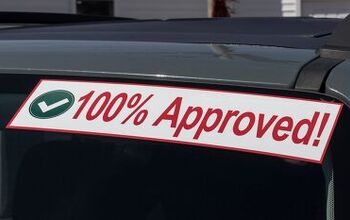Research Fund Authorization Heralds Hydrogen's Return… At Some Point
The House has authorized a new package of industry aid in the form of research and development funds for advanced technology vehicles. H.R. 3246 still needs to be funded, but authorization is for up to $2.9b over the next five years. The AP reports that the bill would fund research on “technologies such as batteries for hybrid vehicles, electric cars, hydrogen fuel cells and infrastructure for the electric grid.” Notice something strange there? President Obama had previously moved to cut funding of hydrogen research, a move that DOE spokesfolks at the time explained by gently reminding that “the probability of deploying hydrogen fuel-cell vehicles in the next 10 to 20 years is low.”
GM’s outgoing hydrogen-booster-in-chief, outgoing R&D boss Larry Burns, took the opportunity to answer hydrogen haters at a Fastlane webchat. And despite the return of hydrogen research funding, his tone was remarkably subdued. Especially for a long-time hydrogen advocate.
I’ve seen a tendency for people to promote one solution over another. They seem to think the question is batteries vs. fuel cells. Or fuel cells vs. biofuels. I have become convinced we need all three. Like I said earlier, it’s “and” not “or.” Unfortunately, many of the players have a vested interest in a single solution. Therefore, they over-promote one and criticize the others.
Meanwhile, Burns and GM are far from the only ones rediscovering hydrogen post-Obama’s kibosh. Daimler’s Dieter Zetsche personifies the German ambivalence towards battery-electric technology in a BusinessWeek interview. “The chances further down the road seem to me better on the fuel-cell side than on the battery-electric side,” he says. Of course Germany has also committed $2.6b towards creating a 1,000 station hydrogen fueling infrastructure. That helps.
But it’s not just the Germans, who missed the early battery EV boat by ignoring hybrids in favor of diesels, who are talking up hydrogen. “Although batteries are evolving, I don’t think they can catch up with fuel cells,” is Honda CEO Takanobu Ito’s take. And though Toyota debuted its plug-in Prius at the Frankfurt Auto Show, the big T’s US head of advanced technology vehicle planning is even comparing hydrogen favorably to lithium-ion battery plug-ins. Michael O’Brien told the California Air Resource Board [via Green Car Congress]:
Major challenges still face plug-ins in terms of product readiness for market and the state of technology. Longer term shifts in consumers values, new frugality, may delay technology adoption by many consumers. These suggest that there is a limited natural market for plug-in vehicles, and that strong incentives will be needed to push demand to the higher levels, and to address challenges regarding battery technology, cost and suitability.
Meanwhile, “Toyota sees a clear path to the commercial introduction of fuel cell vehicles by 2015. We believe that hydrogen and fuel cells have a potential to significantly reduce the environmental impact of the automobile.” The perennial criticism of hydrogen boosters is that their cleaner future is always well, in the future. That hasn’t changed, but the death of hydrogen seems to have been at least slightly exaggerated.
More by Edward Niedermeyer
Latest Car Reviews
Read moreLatest Product Reviews
Read moreRecent Comments
- Ajla Using an EV for going to landfill or parking at the bad shopping mall or taking a trip to Sex Cauldron. Then the legacy engines get saved for the driving I want to do. 🤔
- SaulTigh Unless we start building nuclear plants and beefing up the grid, this drive to electrification (and not just cars) will be the destruction of modern society. I hope you love rolling blackouts like the US was some third world failed state. You don't support 8 billion people on this planet without abundant and relatively cheap energy.So no, I don't want an electric car, even if it's cheap.
- 3-On-The-Tree Lou_BCone of many cars I sold when I got commissioned into the army. 1964 Dodge D100 with slant six and 3 on the tree, 1973 Plymouth Duster with slant six, 1974 dodge dart custom with a 318. 1990 Bronco 5.0 which was our snowboard rig for Wa state and Whistler/Blackcomb BC. Now :my trail rigs are a 1985 Toyota FJ60 Land cruiser and 86 Suzuki Samurai.
- RHD They are going to crash and burn like Country Garden and Evergrande (the Chinese property behemoths) if they don't fix their problems post-haste.
- Golden2husky The biggest hurdle for us would be the lack of a good charging network for road tripping as we are at the point in our lives that we will be traveling quite a bit. I'd rather pay more for longer range so the cheaper models would probably not make the cut. Improve the charging infrastructure and I'm certainly going to give one a try. This is more important that a lowish entry price IMHO.

































Comments
Join the conversation
im amused how these know-it-all americans are avoiding to answer direct questions. its like asking for the time and he answers "5 [s]oranges[/s] bigmacs and i had to eat em all. i was hungry".
@ european I'm guessing your "response" is to me. Firstly, I'm Australian, and secondly, I'm too lazy to respond. Get back to us when you understand closed-loop.